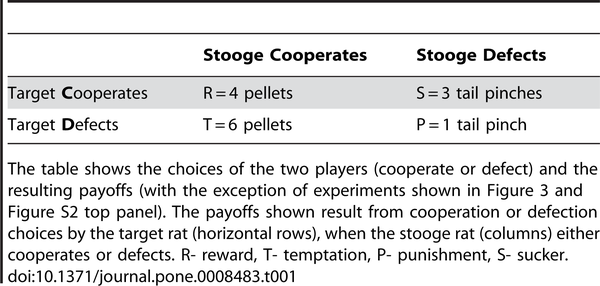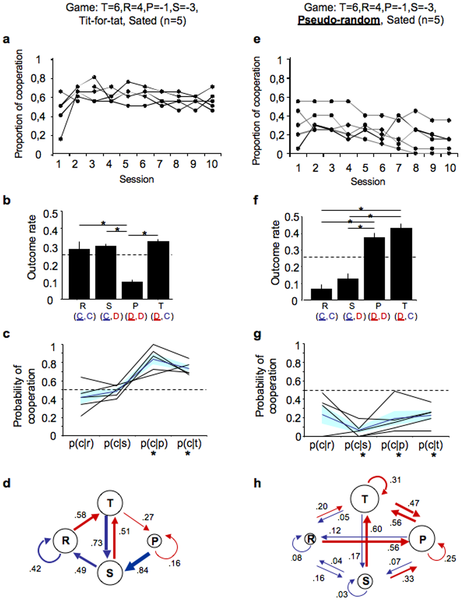Cooperating Rats
http://www.plosone.org/article/info%3Adoi%2F10.1371%2Fjournal.pone.0008483
It is a common attitude amongst humans that we are far smarter than any other creatures in the animal kingdom. However, blinded by our big brains and bigger egos, may underestimate the intelligence of other critters. A study published in January, 2010 shows that if we define intelligence not in terms of communication but in terms of problem-solving, then many animals may be a lot smarter than we’ve given them credit for, specifically the rat. The experiment hypothesized that, contrary to the expectations of most, humans are not the only species capable of figuring out how to strategize to maximize payouts. The PLoS One study, conducted by Duarte Viana and colleagues at the Instituto Gulbenkian de Ciência, Oeiras, Portugal, showed that rats were able to cooperate and adjust tactics depending on the strategy of their opponent, when put in a Prisoner’s Dilemma scenario.
The study adapted the Prisoner’s Dilemma for rats by using payoffs of differing sizes of food and pinching rats’ tails. The experiment used two T-mazes, stacked back-to-back and separated by mesh screens so that the animals could see and smell each other. The researchers fixed one rat’s strategy (the “stooge”) by forcing him to go into either the left or right side of one of the T-mazes on each trial. They tested using a pseudorandom strategy (which implies his actions were determined by some mathematically defined sequence, such as the decimals of pi. Then, to an observer who does not know the mechanism, a pseudorandom sequence is unpredictable) or a tit-for-tat strategy (this rat would initially cooperate, then respond in kind to the test rat’s previous action. If the tester was previously cooperative, the stooge is cooperative. If not, the stooge is not). The experimental rat could then decide whether to cooperate with the stooge rat, or go for the largest food payout by “defecting”.
The results showed that the rats adjusted to their opponent’s strategy. For example, if the experimental rat defected, or acted selfishly, the stooge playing a tit-for-tat strategy would defect on the next trial. Rather than continually going after the high food reward, the experimental rat fell in line and quickly started cooperating again, avoiding a continuous cycle of defection. In fact, when competing against a tit-for-tat opponent, the rats cooperated about 60% of the time. When playing against pseudorandom opponent, where there’s no clear advantage to cooperating, the cooperation rate dropped to ~20%.
My initial instincts are still skeptical, but the report seems very well constructive and informative. I would love to personally witness this behavior because I cannot imagine it. Obviously a 60% cooperation rate doesn’t seem incredibly significant, but the graphs given in the experiment show trends and patterns in behavior that make the 60% seem far more noteworthy. Who knew game theory was so applicable to rodent behavior as it is to humans?
The study does not give direct evidence to show that rats grasp the concept of direct reciprocity, and the pure Prisoner’s Dilemma does not account for emotional or sympathetic motivations. I don’t believe the rats are making emotional or sympathetic decisions. The conductors of the experiment noted that when other experiments observed low cooperation rates, the animals had been food deprived. Fully satiated rats, on the other hand, freely cooperated. These results show that the instinctual drive for food in a hungry animal clouds judgment. Might it also be true that there is a differing correlation between cooperative behaviors for people in circumstances with differing levels of desperation? It certainly seems logical. It’s commonly known that animals often cooperate in nature to altruistically serve the group, whether that means hunting in packs to get more meat, or a surrogate mother animal adopting an abandoned baby to boost the pack’s numbers. Even understanding this, it is surprising to find how well the rats played the game.


